|
|
|
Sort Order |
|
|
|
Items / Page
|
|
|
|
|
|
|
| Srl | Item |
| 1 |
ID:
145867
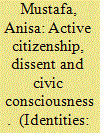

|
|
|
|
|
| Summary/Abstract |
British Muslims have confronted numerous challenges since 9/11 which have rendered their citizenship ‘precarious’ and ‘contingent’, including rampant Islamophobia and a disproportionate impact from tighter security and immigration measures. Additionally, they are also disadvantaged by new forms of governance which promote ‘active citizenship’ based on both neoliberal and resurgent nationalist demands for citizens to be more self-reliant as welfare provision shrinks. This article explores how young British Muslim civil society activists negotiate some of these challenges by analysing their discourses on citizenship and belonging. Based on an ethnographic study, it is suggested that despite experiencing exclusion and marginalisation, young Muslim activists incarnate active citizenship but with reference to a very different set of values and priorities in contrast to nationalist and neoliberal normative ideas. Demonstrating a strong commitment to civic responsibility and participation, these young Muslims defy fears that negative associations with Britishness weaken the value and relevance of citizenship.
|
|
|
|
|
|
|
|
|
|
|
|
|
|
|
|
| 2 |
ID:
180535


|
|
|
|
|
| Summary/Abstract |
Many studies have identified the rise of the drug trade in the inner-city slums of Ankara’s Altındağ district in the wake of post-urban transformation projects (UTPs). However, none of them has thus far discussed the surge of such organized criminal activity in relation to the wider urban policy regime of Turkey. This paper offers the concept of advanced marginality to understand the complex relations between neoliberal urban governmentality and its repercussions in local areas, which results in UTPs, the disintegration of communality, the emergence of slums, and the rise of illicit enterprises. The paper argues that the formation of organized drug trade in Altındağ following the development of UTPs is an outcome of the advanced marginality resulting from the changing urban governmentality and its deliberate neoliberal political preferences.
|
|
|
|
|
|
|
|
|
|
|
|
|
|
|
|
| 3 |
ID:
152110
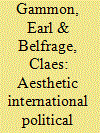

|
|
|
|
|
| Summary/Abstract |
Though aesthetics is commonly understood as the reflection on art, and especially beauty, it is a broader concern, captured by the term’s etymology in the Greek ‘aisthesis’, referring to perception and sense impressions. Aesthetics, though, is not simply a passive process, of how the outer world strikes the mind, but an interactive one, which, through our selective attention, we attenuate the complexities of reality. Aesthetics is about the formation of the objects that constitute our social milieu, those we invest in to give rhythm, order and unity to our lives. Aesthetics is also, vitally, about the formation of the self, about how we constitute ourselves as objects in relation to the world.
|
|
|
|
|
|
|
|
|
|
|
|
|
|
|
|
| 4 |
ID:
155166
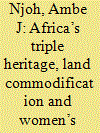

|
|
|
|
|
| Summary/Abstract |
Women have less access to land than men in Africa. Previous analyses have typically identified African indigenous culture as the problem’s exclusive source. With Cameroon, Kenya and Sierra Leone as empirical referents, an alternative explanation is advanced. Here, the problem is characterized as a product of Africa’s triple heritage, comprising three main cultures, viz., African indigenous tradition, European/Christianity and Arabia/Islam. The following is noted as a major impediment to women’s access to, and control of, land: the supplanting of previously collective land tenure systems based on family or clan membership by ‘ability-to-pay’ as the principal determinant of access to land.
|
|
|
|
|
|
|
|
|
|
|
|
|
|
|
|
| 5 |
ID:
121197
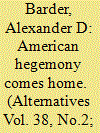

|
|
|
|
|
| Publication |
2013.
|
| Summary/Abstract |
International theorists have long argued over the longevity of American hegemony and whether or not the American-centered international order is currently in crisis. What remains largely missing in many of the analyses of the history and present of American hegemony is an examination of how maintaining global hegemony affects or has affected domestic American political and economic institutions. Looking back at the early 1970s, I examine the nexus between the crisis of American global hegemony in the aftermath of the Vietnam War, the project of neoliberalization in Chile and how the Chilean socioeconomic "laboratory" set an important precedent for the subsequent adoption of neoliberal reforms in the United States under the Reagan Administration. The reassertion of American hegemony was coextensive with a neoliberal project that was initially experimented with in Chile under the authoritarian rule of Augusto Pinochet.
|
|
|
|
|
|
|
|
|
|
|
|
|
|
|
|
| 6 |
ID:
185630
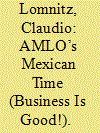

|
|
|
|
|
| Summary/Abstract |
President Andrés Manuel López Obrador has promoted himself as a historical figure equal to the great heroes of Mexico’s national mythology. His populist rhetoric denigrates political opponents as enemies of the people. But more than two years into his term, his promises of economic growth have failed to materialize, partly because of his attachment to austerity.
|
|
|
|
|
|
|
|
|
|
|
|
|
|
|
|
| 7 |
ID:
177936


|
|
|
|
|
| Summary/Abstract |
This article examines self-making projects and the desire for respectability within queer lives in Kolkata, across distinct class-caste affiliations. We argue the desire for queer respectability take virtual forms, sartorial fashioning, and yet remains a convoluted project mirroring Kolkata’s relationship with neoliberal capitalism. The authors engage with a young lesbian identified activist and a young male fashion designer whose sexual identity remains tacit. Their virtual and real interactions reveal how both the characters conceal their caste and class status through projects of sartorial fashion in order to be read as appropriately queer. The article argues for understanding sexual and gender identities in relation with class, and caste status, as well as ethnic and religious identities, thereby revealing how the liberatory potentials of queer activism is a form of emergent neoliberal governmentality within contemporary India.
|
|
|
|
|
|
|
|
|
|
|
|
|
|
|
|
| 8 |
ID:
143633
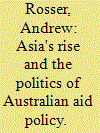

|
|
|
|
|
| Summary/Abstract |
The economic rise of developing Asia has given impetus to debates over the geographic orientation, strategy, organisation, and collaborative relationships of the Australian aid programme. This paper examines these debates, Australian government responses, and the politics underlying these responses. It points to, among things, the different ways in which the Labor Party and the Liberal–National Coalition have dealt with these issues, reflecting their different constituencies and foreign policy philosophies. The paper also assesses the future trajectory of Australian aid policy, in particular, the extent to which it is embracing the Chinese model of aid.
|
|
|
|
|
|
|
|
|
|
|
|
|
|
|
|
| 9 |
ID:
155414
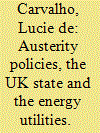

|
|
|
|
|
| Summary/Abstract |
In 2008, the economic downturn coincided with a major shift in the energy sector paradigm. This state of emergency forced the UK government to try to steer the objectives of its major energy players. This crisis put the UK state's capacity to influence its mostly privately-owned energy sector to the test. Using the example of energy utilities, this article aims to explore whether the austerity agenda impacted the relationship between the UK state and its public services. The purpose is to determine whether current multiple crises have forced the UK state to adopt an exceptionally interventionist approach that doesn't tally with the austerity agenda, or whether these crises merely revealed dynamics which had been underlying in the management of its energy utilities since the beginning of the neo-liberal era.
|
|
|
|
|
|
|
|
|
|
|
|
|
|
|
|
| 10 |
ID:
106653


|
|
|
|
|
| Publication |
2011.
|
| Summary/Abstract |
This contribution explores how authoritarian governmental practices come to inform everyday civilities-manners and forms of interaction among the subjects of government. With a focus on Egypt it examines how forms of government and rule deployed by the state give rise to particular modes of action, norms of interaction and socio-political dispositions among the citizenry. Central to this analysis is the examination of political subjectivities that develop in regular encounters with the agents and agencies of the state. These subjectivities generate understandings of self in relation to the apparatuses of power-out of intimate knowledge of their workings and of the multiple orders at which they operate. Integral to citizen subjectivities are civilities cultivated in interaction with the state and with fellow subject-citizens.
|
|
|
|
|
|
|
|
|
|
|
|
|
|
|
|
| 11 |
ID:
155429
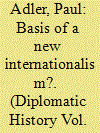

|
|
|
|
|
| Summary/Abstract |
This article examines the thought and activism of the Institute for Policy Studies (IPS), a progressive U.S. think tank. During the 1970s IPS worked to promote Third World development, first by backing calls for a New International Economic Order and then by opposing the neoliberal turn at the decade’s end.
|
|
|
|
|
|
|
|
|
|
|
|
|
|
|
|
| 12 |
ID:
068681
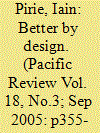

|
|
|
| 13 |
ID:
186834
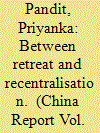

|
|
|
|
|
| Summary/Abstract |
State-owned enterprises (SOEs), a key constituent of China’s economy, are an important reference for analysing China’s evolving state-market relations. Market-oriented reforms introduced in the SOE sector over the past four decades have seen the Communist Party of China (CPC) loosen its control over SOEs, shedding a large number of loss-making enterprises, and significant restructuring of remaining enterprises, including by public listing. But these achievements still fall short of making Chinese SOEs ‘modern enterprises’, and they continue to be extensions of the Chinese Party-state. Using Party documents, speeches and policy announcements, this article explores key changes and continuities in China’s state-owned sector in the post-liberalisation era. It contends that the neoliberal turn in China’s economic transition cannot be understood in the radical separation of state and market configurations but that reform and restructuring of SOEs have to be situated in a political-institutional landscape where multiple interests compete over the formulation of economic policy.
|
|
|
|
|
|
|
|
|
|
|
|
|
|
|
|
| 14 |
ID:
187045
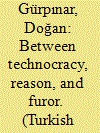

|
|
|
|
|
| Summary/Abstract |
This article aims to demonstrate the tension inherent within the Turkish opposition between those favoring technocratic anti-populism and/or pragmatic politics and those calling for a passionate and resolute anti-AKP platform seeking revenge. These competing inclinations offer alternate anti-populist platforms and ‘styles.’ The article asks whehter opposition to a populist regime inherently generates an anti-populist platform that ideologically confronts it. The article examines three contenders to President Erdoğan as representatives of three alternative anti-populist styles. It also reflects on the debates among various public intellectuals around the ways to electorally defeat populism.
|
|
|
|
|
|
|
|
|
|
|
|
|
|
|
|
| 15 |
ID:
171702
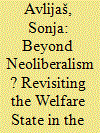

|
|
|
|
|
| Summary/Abstract |
Scholars of political economy have criticised the Baltic states’ transition to capitalism as socially ‘disembedded’ and shaped by a zealous form of neoliberalism. This article argues that the Baltic welfare states have experienced a more complex post-socialist transformation than suggested by the ‘neoliberal retrenchment’ narrative, which relies on the traditional definition of the welfare state and focuses solely on cash compensation for the ‘losers’ of transition. By uncovering higher investment in education, more generous labour market policies and a larger expansion of public sector employment than in the Visegrád countries, the article uncovers social investment oriented welfare states in the Baltic.
|
|
|
|
|
|
|
|
|
|
|
|
|
|
|
|
| 16 |
ID:
122972
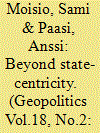

|
|
|
|
|
| Publication |
2013.
|
| Summary/Abstract |
This paper scrutinizes the challenges which scholars face when examining the interconnections between the state and geopolitics in the purported "transnational world". By discussing the relational perspective which "opens" the traditional state-as-a-monolith centric view of geopolitics, the paper sets a foundation for the present special section on the changing geopolitics of state spaces. The paper proceeds by first reflecting on the move from geopolitically "closed" to more open state territories, and then considers some of the ways the state has been examined in spatially sensitive research with respect to geopolitical scholarship. Finally, the paper maps out possible horizons for forthcoming studies on the geopolitics of state spaces.
|
|
|
|
|
|
|
|
|
|
|
|
|
|
|
|
| 17 |
ID:
117485
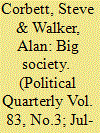

|
|
|
|
|
| Publication |
2012.
|
| Summary/Abstract |
This article contributes to the steady flow of critiques of the big society idea contained in The Political Quarterly. It focuses chiefly on two sets of parallels. The first is between the big society and the policies pursued by the Thatcher government which, despite their obvious rhetorical differences, contain many striking similarities, including their neoliberal origins, application of the 'crowding out' thesis and uncritically idealised notions of community. The second is between the big society and a policy with the same name pursued doggedly by the Chinese Communist Party for nearly 20 years until being abandoned as a failure. Lessons for the Prime Minister's flagship policy are drawn from the Chinese experience. The article concludes with a welcome for the rediscovery of the social by public policy and some suggestions as to how a more participative and democratic state could follow from this breakthrough.
|
|
|
|
|
|
|
|
|
|
|
|
|
|
|
|
| 18 |
ID:
065977
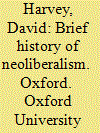

|
|
|
|
|
| Publication |
Oxford, Oxford University Press, 2005.
|
| Description |
vii, 247p.
|
| Standard Number |
0199283265
|
|
|
|
|
|
|
|
|
|
|
|
Copies: C:1/I:0,R:0,Q:0
Circulation
| Accession# | Call# | Current Location | Status | Policy | Location |
| 050188 | 330.122/HAR 050188 | Main | On Shelf | General | |
|
|
|
|
| 19 |
ID:
165655


|
|
|
|
|
| Summary/Abstract |
What factors account for the increasingly erratic U.S. policy towards China, marked by growing domestic divisions and tensions over means and ends? Can the United States contain China, as called for by its military leaders and a growing segment of corporate America? Or, can the Sino-American rivalry be managed peacefully and without plunging the world into depression? The preoccupation with rhetoric and agency in the analysis of U.S. foreign policy overlooks the role of social forces and class interests. The confusion and vacillation in U.S. trade policy are amplified by the manifest dysfunctions of the Trump administration, but they ultimately reflect a deeper, double logic, expressing not only the “Thucydides trap” in which a declining but still formidable hegemon contemplates submission to a rising power but also a crisis of neoliberalism.
|
|
|
|
|
|
|
|
|
|
|
|
|
|
|
|
| 20 |
ID:
176988
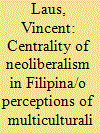

|
|
|
|
|
| Summary/Abstract |
My research focuses on how Filipina/os respond to stigmatisation in Canada and the United States and how those responses are impacted by neoliberal ideology and perceptions of multiculturalism. The research uses in-depth interviews of 58 Filipina/o students in Toronto and Los Angeles to analyse the cultural repertoires available to them that enable or constrain a sense of belonging. Canada offers federally funded multicultural policies toward immigrant settlement and ethnic institutions, compared to the informal approach to multiculturalism in the United States. Nonetheless, the interviewees report that Filipina/os experience stigmatisation on a group level despite efforts to ‘fit in.’ I argue that the dual forces of Western neoliberalism and past colonisation in the Philippines influence tendencies toward either a decolonisation discourse that criticises social structures or a neoliberal discourse that focuses on agency. Perceptions of multiculturalism affect which tendency Filipina/os rely on to mobilise destigmatisation strategies.
|
|
|
|
|
|
|
|
|
|
|
|
|
|
|
|
|
|
|
|
|